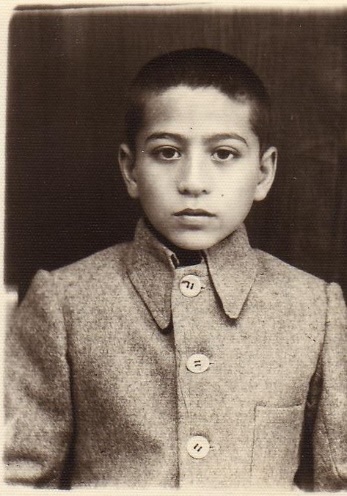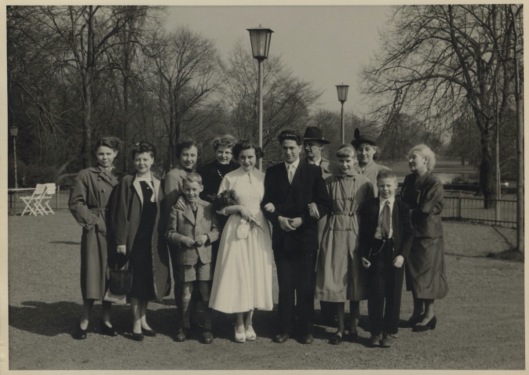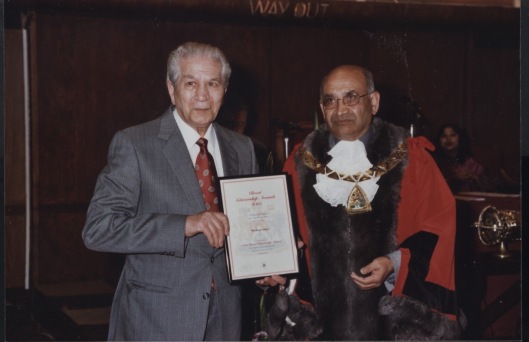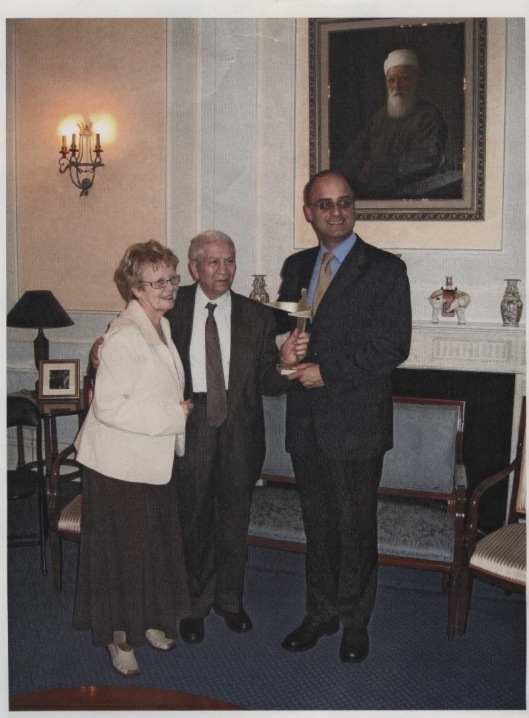The following account has been written by Hassan’s children, Farid Afnan and Parvin Morrissey. The quotations are taken from the transcript of a video of Hassan which his eldest daughter Shahin recorded in 2001.
Birth
Hassan Afnan was born in Yazd in 1926. He and his brother Abbas were descended from two of the maternal uncles of the Báb through his (Hassan’s) mother from Hájí Mírzá Hassan-‘Alí and through his father from Hájí Mírzá Siyyid Muhammad.
Hassan spent most of his childhood in Shiraz, where his mother’s branch of the family lived, but spent summer holidays in Yazd, visiting his grandmother, Liqa Khánum. She was the daughter of Hájí Mírzá Muhammad Taqí Afnán (Vakílu’d-Dawlih), who supervised and largely paid for the building of the Mashriqu’l-Adhkár in ‘Ishqábád.

Hassan as a young child
Childhood
Hassan had a happy childhood, but also recounts examples of the challenges of being a Bahá’í child at the time:
“It was not easy to be a Bahá’í child. Gangs of boys would attack us on the way to and from school, so I would walk with one of the bigger, stronger boys who I was friendly with, and go via different routes to avoid the gangs. There were also underground tunnels between our house, and the houses of our cousins who lived in the same street. This was to allow Bahá’ís to escape if they were being attacked. Near the House of the Báb in Shiraz, we had a Bahá’í Centre where we held most of our meetings. Some youngsters would come and throw stones at us. To protect the community, two Bahá’í army officers stood at the front door and unsheathed their swords to warn off attackers.”
“I remember one day we had a religious education teacher who took down a book from the top of a cupboard and started asking questions. He said that if a father and mother are not Moslems, their children are illegitimate. My brother, myself and my cousin (who was at the same school) therefore went on strike – we didn’t go to school the next day. The head master summoned us, and my mother went with us. We told the head master what the teacher had said, and my mother demanded that the teacher apologise and take back what he had said, and she got her apology!”
Hassan’s mother, Hovieh Khánum, was small of stature, but a very strong and resourceful woman.
“In those days, women had no public life and there were no schools for girls, so my mother had no formal education. In our house in Shiraz, my mother let one of the rooms to another family, the husband of whom was a teacher. In lieu of some rent, he gave her some lessons. I remember, my mother and my cousin being on one side of the curtain and he was on the other side, teaching them reading, writing, and mathematics. I also remember my mother learning by herself. She would tell our servant “Go and buy from the grocery shop so many ounces of this, so many ounces of that. And the servant would come back with a chitty and she would ask him how much things had cost, and through this she learned adding up and writing.”
When the Singer Company first sent sewing machines to Iran, Hovieh, a strong advocate of women’s advancement, obtained one, and opened her home to local women so they could come and learn how to operate them.
Education and Career
“My brother Abbas was two years older than me. When he started school, I wanted to as well. I made such a fuss that my mother pleaded with the Dean of the school to let me sit in on the lessons. That’s how I ended up being with my brother in the classroom, finishing school two years early. In our final exams, I was the student with the best marks in the whole of Iran. Because I was so young when I finished school, my mother said I should take a year off and I spent it with her at our farm between Yazd and Shiraz. After that I came to Tehran to go to university. I was a member of various Bahá’í youth committees at that time and took part in many activities. After graduating I worked for the National Iranian Oil company for a year, and then left to do my military service.”

Members of a youth committee in Shiraz circa 1950s
L to R: Front row, Mr Ali Nakhjavani, Abul’Qasim Afnan (Hassan’s cousin and Custodian of the House of the Báb). Back row: Yousef Abbasian (kidnapped, and disappeared in 1980), Mr. Samandari, Hassan Afnan
Pioneering to Europe
In response to a call for pioneers from the beloved Guardian in the early 1950s, Hassan and Abbas both left Iran for Europe to further their studies. Hassan stayed for one year in Switzerland, before moving to Germany. While at the university of Karlsruhe, he met his future wife, Margot. She became interested in the Faith and together they attended the Intercontinental Conference in Stockholm in 1953.

Hassan and Margot at the Stockholm Intercontinental Conference, 1953
Margot declared her belief in Bahá’u’lláh at the conference, and they married the following year. They pioneered to become founder members of the first Spiritual Assembly of Dusseldorf. Two daughters, Shahin and Parvin, were born in Germany, and in 1960, Hassan’s work took the family to London.

Hassan and Margot’s Wedding in 1954 with local believers in Dusseldorf
Ursula Muhlschlegel, first wife of Hand of the Cause Dr Muhlschlegel, is third from left
Early Years in London
The family initially settled in Colindale, North London. In 1960, there was one Local Assembly for the whole of London, with 19-Day Feasts and other gatherings being held at the National Bahá’í Centre at 27 Rutland Gate. Hassan was elected to the Assembly and served for several years until 1965 when London was divided into 32 boroughs.

London Spiritual Assembly 1965
Standing L to R: Asher Nazar, Ron Stee, Ali Golestaneh, Eruch Munsiff, Donald Millar, Hassan Afnan
Sitting: Kathleen Hyett, Meherangiz Munsiff, Vivian Isenthal
The house in Colindale was the venue for many Bahá’í gatherings, including weddings and Holy Day celebrations. Margot was an excellent cook and baker who made everyone very welcome in her home. The house also hosted members of the Afnan family who came to London to attend the first Bahá’í World Congress in1963. Shortly after this, a son, Farid was born, and the family moved to nearby Wembley, which was to become Hassan and Margot’s home for the rest of their lives.

Members of the Afnan Family, with Amatul’Bahá, Rúhhíyih Khánum, at the First Bahá’í World Congress, Royal Albert Hall, London. 1963
Back row: Hassan is fourth from left, his brother Abbas is sixth from left, and their cousin, Farhang is on the far right
Middle row: Hand of the Cause Hassan Balyuzi at the right hand end, Margot is third from the right
Front row: Shahin and Parvin are on the far right-hand side
Life in Brent
After the division of London into boroughs in 1966, Hassan and Margot became founding members of the Spiritual Assembly of Brent, an Institution on which Hassan served continuously until a few years before his passing. Hassan also served on several national committees during this time, including one for the Guardian’s Grave, Overseas Goals and Religious Education committees. In addition, he served as a delegate at National Convention for many years. The family regularly attended summer schools, and attended the 1968 Intercontinental Conference in Palermo and the subsequent events at the World Centre to mark the centenary of Bahá’u’lláh’s arrival in Akka.

Members of Brent Spiritual Assembly
Left to right: Unknown, Kathleen Hyett, Hassan Afnan, Margot Afnan,
Nargez Manocha, Roshan Knox, Dermod Knox
Hassan was never happier than when he was helping others. After the Iranian revolution in 1978-79, he assisted a number of Bahá’í refugees, helping them to find accommodation, and navigate the British social security system. Margot would help them furnish their new homes, often giving them her own belongings.
Hassan was very active in Brent civic affairs, believing that if Bahá’ís joined other organisations and were reliable, enthusiastic and hard-working, they would be respected and could have an influence. He was very determined and focussed – an exemplar of ‘Abdu’l Bahá’s admonition to do things to the best of one’s ability. He was a founder member of Brent SACRE and served as its chair for many years. Hassan also helped several other Bahá’í communities in London to become active members of their local SACRE. As a result, the Bahá’í Faith was included in the religious education syllabus in several London boroughs, and his many contacts helped him to implement the World Citizenship Project, involving hundreds of children, in Brent schools for over ten years.
Hassan was a founding member of Brent Interfaith Committee and served as its Chair for many years. He was highly respected by all the religions represented on Interfaith, and when a new Interfaith Centre was opened in Brent in 2000, his granddaughter Yasmin was asked to present flowers to Prince Charles at the official opening.

Official Opening of Brent Interfaith Centre Standing with Prince Charles, L to R: Farhang Afnan, Margot, Hassan and Alex Afnan
In recognition of his long and outstanding community service to the people of the Borough, Hassan was awarded the Brent Citizenship Award in 2002.

Hassan receiving the Brent Citizenship Award from the Mayor of Brent
A long collaboration with the education qualification company Edexcel resulted in a GCSE module on the Bahá’í Faith and Christianity, significantly raising the profile of the Bahá’í Faith among examination bodies. To acknowledge his efforts in the field of education, spanning decades, in 2008 Hassan was awarded the Joe Foster Lifetime Service Award for his work in religious education.

Hassan Receiving the Joe Foster Lifetime Service Award from Dorothy Foster and Kishan Manocha
Sadly, Margot passed away from cancer in 2003. Hassan lived independently for the next seven years and remained active in his local community. He also remained active with his local chess club, though in the latter years of his life this was mostly done through “correspondence chess”. In 2006 he was invited to participate in celebrations marking the 50th anniversary of the formation of the first Spiritual Assembly of Düsseldorf.
In 2010, whilst walking near his home, Hassan suffered a fall from which he never recovered and passed away three weeks later. He is buried with his beloved wife, Margot, in the Bahá’í section at the New Southgate Cemetery, London.
_______________________

Hassan and Margot’s children: Shahin, Parvin and Farid
Shahin lives in South Yorkshire, near her children, Neil and Sita. She has four grandchildren – Callum, Liam, Sophia and Lucy.
Parvin married Pat Morrissey and lives in Scotland. They have two sons, Sean and Matthew, and one granddaughter, Aurora.
Farid and his wife Mercedes live in Pinner, North West London. They have three children, Yasmin, Alex and Marco, and one grandson, Nathan.
____________________________________
January 2022

I love all of these short biographies of the early Baha’is. They make me realize that while progress still seems very slow in some areas…including mine, we owe a debt of gratitude to these early believers for their work. In this case, particularly education.
Pingback: Hassan Afnan (1926 – 2010) - Bahai Journal